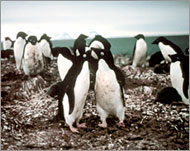Celestial spectacle over South Pole
The penguins were clearly unimpressed but umbraphiles (eclipse chasers) gladly forked out $9000 each to catch a two-minute glimpse of a total eclipse over the South Pole.

The rare celestial spectacle at 22:40 GMT on Sunday had people reacting in all kind of ways, with a young woman running three km on frozen ice to get the best view as her friends took the more sensible ski route.
Still others were ensconced in the comfort of a chartered ice-breaker off Russia’s Antarctic base of Mirny while a group of 300 star-gazers and scientists in a special flight for the round-trip from Melbourne enjoyed a spectacular view in their seats above the clouds.
Scientist Bob Jones, station leader at Australia’s Davis Antarctic Base, travelled by snow-car with nine colleagues across the sea ice to catch a better view from an island three km closer than the base.
Clear view
“Some people skied across, and one young woman actually ran across to this island because of course at the moment it’s surrounded by ice,” Jones said.
“There was some high level cloud, but the view was good and we could see it clearly in the east.
 |
|
The only ones not amused by the |
“From the beginning of the eclipse it was about six degrees above the horizon and it was above the Antarctic plateau here. It rose to about 10 degrees, so it was higher in the sky than I would have thought.
“At the full eclipse, or the fullest it reached here of 98.5% it went darker although everything here is white – the plateau is white, the icebergs are white and the ice is white. But it did appear to go noticeably darker.
“Viewing the sun through some exposed x-ray paper or proper glasses you could actually see the whole of the sun being covered except for a small slither when it was at its final level,” Jones, a veterinary pathologist from Bendigo in Victoria, said.
Penguins stay calm
“We were going to view it from there to see if it had the same effect on the penguins as us and they just kept on incubating their eggs.
“But there was no discernable change in them, they didn’t show any degree of agitation or worry or anything,” he added.
One of the passengers on the chartered flight was Australian Antarctic Division research scientist Andrew Klekociuk, who said the last total eclipse occurred over the Southern Ocean in 1985, but nobody actually saw it.
“No one has ever seen a total solar eclipse from Antarctica before,” he said before the flight.
It provided a unique opportunity to study aspects of the earth’s upper atmosphere, particularly high altitude noctilucent, or “night shining“, clouds and the solar corona, or sun’s outer atmosphere.